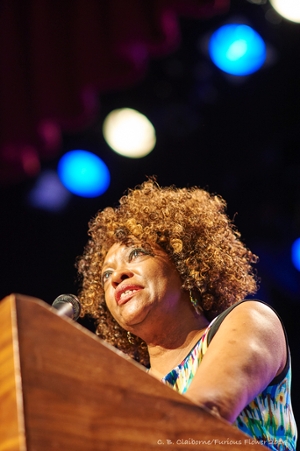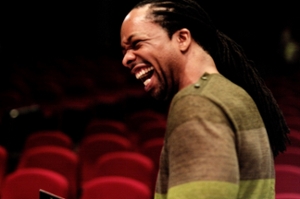In the Company of Poets
NewsIn conjunction with the 2014 Furious Flower Poetry Conference, JMU English professors Laurie Kutchins and Joanne Gabbin assigned responsive writing. Kutchins wanted to find a way to “flower young voices,” and Gabbin encouraged her students to “shadow” a particular poet: introduce themselves and converse, attend the poet’s readings, and record their impressions. Students in Kutchins’ Advanced African American Poetry class and Introduction to Poetry Writing Workshop crafted poems, and students in Gabbin’s African American Poets class produced personal essays.
The following poems and essay excerpts were chosen as selections of merit and published here to give you a glimpse into Furious Flower from the perspective of young scholars. Two additional essays, considered the best in their class, were published in their entirety: “Patricia Smith: Golden Wordwoman” by Brittany Fisher and “Seeking Komuyakaa” by Austin Shifflett.
. . .
Excerpt from “Rita Dove: Poetry as the Noblest of All Art”
by Tori Panetta
When Rita Dove took center stage, the crowd applauded and then quickly silenced in its shared enthusiasm for her readings. Of all the poets attending the Furious Flower Conference, she was dressed in the most colorful outfit, with a beautiful tunic and turquoise tights. The electric blue stage illuminated her features. This was not the Rita Dove I expected, but I loved every second of her poetry and wit. Her kinky-curly hair, which she readily revealed was a wig, bounced as she swayed while reading her prized poems.

The last poem she shared with the audience was “Ode to My Right Knee,” a piece in which she addresses her “crazed cartilage calmly chipping / away … haranguer, hag, hanger-on ...” It ends with “jive jiggy joint: / Kindly keep kicking,” a nod to her love of dancing.
Dove also plays the cello, but she believes that, of all her creative outlets, poetry is “the noblest of arts.” She explains that it is an art form not dependent on anyone else. With dance one has to rely on a partner, and with music one has to rely on the orchestra. Dove says, “Poetry was my first real passion. It will always be my true love. It is glorious and impossible and bigger than me. Much, much bigger than me.”
Tori Panetta is a senior majoring in Sociology.
Photo by C. B. Claiborne.
. . .
Furious Flower
by Sarah Meirose
Standing among these incredible women,
many of whom I now call friends,
I have never felt more at peace.
An embrace here, a hand-hold there.
“I love your dress,” the Dove calls.
Sitting between all these powerful women,
I feel power blooming in myself.
Power of words echoing in my throat and climbing
up to auditorium rafters—furious flower pushing
the dirt out of my veins and cracking my shoulders aside
to let the sunshine in at last.
A junior English major, Sarah Meirose is also double-minoring in Creative Writing and Theatre.
. . .
Excerpt from “Rewind, Play, Praise: Jericho Brown”
by Rachel Primm
Jericho Brown started taking his writing seriously when he was surrounded by other amazing poets, such as Terrance Hays, Yona Harvey, Major Jackson, Toi Derricotte and Gloria Wade Gayles. “Other people’s interest in my work made me take it more seriously,” he recalls.
Brown’s poems focus primarily on relationships, sexuality, race and God. When I asked about his inspirations, whether they are places or other poets, he replied, “Every time I write a poem … I look at something else in the world that pleases me, or that I think has some sort of transcendent beauty, some sort of everlasting beauty, and I then want to recreate that.” Brown wants these poems to please people like music pleases us, and he takes a great deal of inspiration from music and rhythm but isn’t limited by that: “Wherever I can get a poem, I’m willing to get a poem.”
Please¸ Brown’s first book, won the 2009 American Book Award. In it, he separated the contents into four sections: Repeat, Pause, Power, and Stop. Terrance Hayes called Brown’s writing “the poetry of blood-ship: the meaning of family, of love, of sexuality; the resonances of pain and the possibilities of redemption.”
This year, Brown’s second book was published by Copper Canyon Press. The New Testament features all new poems, of which Brown read a few at the Furious Flower Poetry Conference this fall, including “N’em,” “Labor,” “Langston’s Blues,” and “Heart Condition.” Especially when listening to him read, you roll onto the rhythm and the beat within each line. With “Langston’s Blues,” he would get caught on the words. He would pause briefly before the word blood, and take in a heavy gulp: “When I say Congo, I mean / Blood. When I say Nile, I mean blood.” That weighted gulp brought substance to the poem; it brought beat. In “Heart Condition,” he writes of a long-distance relationship: “My man flies / To touch me. Sky on our side. Sky above his world / I wish to write.” It is a sentimental poem, and Brown read this also quite slowly, in a hushed voice.

Brown’s style was chic and laid back. Pairing a dark, long sleeved shirt and army-style jacket with light-wash jeans, Brown epitomized style and comfort. He is quite tall and muscular but overall relaxed in posture. His smile, I swear, brightened the entire room. He was contagious; he gave off an aura of confidence and positivity. When I introduced myself and asked what he thought about the conference, he smiled and said “I am so happy to be here—I’m really grateful for this.”
Presenting his poems, he revealed a more somber side. He would speak in a hushed voice, varying the pace with his words. With his very clear enunciation, you couldn’t miss a beat. It was unique, it was signature, and it was hypnotizing.
I asked what he wanted his readers to take away from his poetry, what he considered his main point. He confessed to me that this was hard to answer, and that he did not think he had a particular point to make: “I’m so busy thinking about line breaks, metaphors, similes, line length, tones, sound, and rhythm that I don’t think about it in terms of a ‘point’ to get across.” However, he did say that he had a subject to his poetry, and that was the idea that “poems allow us to relive whatever it is we choose to relive.” Essentially, Brown aims to take people places with his poetry and activate the minds of his readers so that we are all able to see the beauty in this world. Even in the gory, ugly, dark places, Brown wants to be able to see beauty.
Rachel Primm is a sophomore with a double-major: English and Africana Studies.
Photo by Thomas Sayers Ellis.
Editor's note: Furious Flower’s assistant director, Elizabeth Hoover, interviewed Brown early in 2014 for our online literary magazine, The Fight & The Fiddle. Read her article and see the video "I'm not scared of my fear:" Jericho Brown on craft, politics, and compassion in poetry.
. . .
Inspiration
by Leslie Johnson
I sit in this hollow auditorium
Waiting for the reading to begin.
As I wait, people start to surround me
And I can feel their enthusiasm and energy.
Soon, a woman walks onto the stage
Introducing everyone. She says there will
Be poets such as Elizabeth Alexander,
Yusef Komunyakaa, and even Rita Dove.
These poets come up, one by one,
Each one leaves me in awe.
Their strong words and visions
About racism, sexism, violence,
Political exploitation, and injustice
Make me feel exposed.
I see this image of human suffering
But at the same time, I see lyrical beauty.
Their words strip me down and
Expose my feelings, but they also
Leave me feeling empowered, like I
Have this newfound wealth to share with
The world. I thank these poets for their
Strong testimonies. These powerful lyrics
Helped people heal, transform, and become
Renewed. There is something so empowering
About that, and I thank them for what they have done.
Leslie Johnson is a Health Sciences major and Music minor who plans to pursue a master’s degree after she graduates this December.

